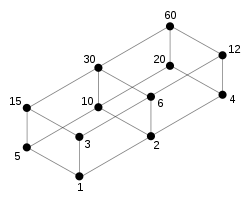Equidigital number
An equidigital number is a number that has the same number of digits as the number of digits in its prime factorization, including exponents but excluding exponents equal to 1. For example, in base-10 arithmetic 1, 2, 3, 5, 7, and 10 (2×5) are equidigital numbers. All prime numbers are equidigital numbers in any base.
A number that is either equidigital or frugal is said to be economical.
See also
References
Divisibility-based sets of integers |
|---|
| | Overview | | |
|---|
| | Factorization forms | |
|---|
| | Constrained divisor sums | |
|---|
| | With many divisors | |
|---|
| | Aliquot sequence-related | |
|---|
| | Other sets | |
|---|
|
